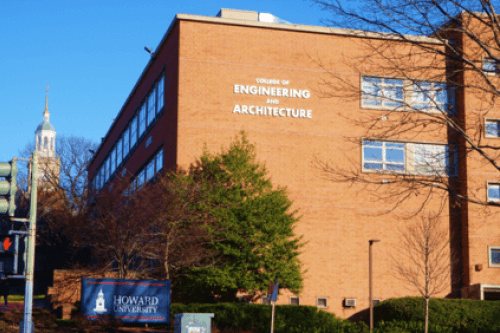WASHINGTON – The Alfred P. Sloan Foundation has awarded $1M to the Quantum Biology Laboratory (QBL) at Howard University, under the direction of principal investigator Philip Kurian, PhD, as part of its “Matter-to-Life” Program.
Advances in how quantum physics enhances signaling in the warm, wet, and wiggly world of biology have made it possible for scientists to address old questions from novel vantage points: How do living systems arise from nonliving matter? How does life organize from biomolecular building blocks? What is the role that light plays in the origins of life itself?
The grant will support the lab in studying how self-organizing processes give rise to goal-oriented behaviors in the reassembly, agential decision-making, and information processing of the multinucleate slime mold Physarum polycephalum. Colleagues from the Allen Discovery Center at Tufts University will work in collaboration with the QBL to achieve these objectives.
“The mystery of how life transforms via light,” explained Kurian, a theoretical physicist, “is one of the most significant and vexing problems for current practitioners and even the earliest proponents of quantum theory. Quantum biology—the application of quantum theory to understanding life’s complex milieu—forces us to reexamine our origins, all the way at the cosmic beginning, and to chart how purpose and agency can arise from matter governed by physical laws.”
Over the project term, Kurian’s team will use the funding to build upon its previous work in modelling and measuring how quantum optical effects in cytoskeletal networks enable living matter to process information in ultrafast communication channels. These collective and cooperative quantum phenomena in protein architectures may operate throughout the cellular networks of organisms such as Physarum.
Since Kurian and colleagues had already spent almost a decade studying the photophysics of these networks, they were primed to address the Sloan Foundation’s Matter-to-Life research goals. With the QBL having reached the end of funding for an existing project, the Sloan grant came at just the right time, allowing the QBL to pursue Kurian’s long-term vision through new avenues. The applications of this research will have impact in diverse fields including neuroscience, basal cognition, quantum computing, and light-harvesting for energy storage.
“The Quantum Biology Lab is a wonderful example of what happens when researchers are free to collaborate and to think within and beyond their specific disciplines. Dr. Kurian continues to advance groundbreaking science while also sharing with the world a research environment informed by profound philosophical inquiry and Howard’s uniqueness. I look forward to seeing how this award will bring about a new quantum renaissance,” said Dana A. Williams, dean of the Graduate School at Howard University.
The beginnings of a powerful idea are often hard to pin down. But Kurian reflects in wonder, “As a kid I was obsessed with the Teenage Mutant Ninja Turtles, who mutated from a slimy glowing ooze. How cool is it that real-life organisms like the humble slime mold exist, that might unlock quantum clues to the deepest questions: Which came first – light, life, consciousness – or are they inextricably connected?”
About Howard University
Founded in 1867, Howard University is a private, research university that is comprised of 14 schools and colleges. Students pursue more than 140 programs of study leading to undergraduate, graduate and professional degrees. The University operates with a commitment to Excellence in Truth and Service and has produced one Schwarzman Scholar, four Marshall Scholars, four Rhodes Scholars, 12 Truman Scholars, 25 Pickering Fellows and more than 165 Fulbright recipients. Howard also produces more on-campus African American PhD. recipients than any other university in the United States. For more information on Howard University, visit www.howard.edu.
About the Alfred P. Sloan Foundation:
The ALFRED P. SLOAN FOUNDATION is a not-for-profit, mission-driven grantmaking institution dedicated to improving the welfare of all through the advancement of scientific knowledge. Established in 1934 by Alfred Pritchard Sloan Jr., then-President and Chief Executive Officer of the General Motors Corporation, the Foundation makes grants in four broad areas: direct support of research in science, technology, engineering, mathematics, and economics; initiatives to increase the quality, equity, diversity, and inclusiveness of scientific institutions and the science workforce; projects to develop or leverage technology to empower research; and efforts to enhance and deepen public engagement with science and scientists. sloan.org | @SloanFoundation
About the Quantum Biology Laboratory (QBL):
The QBL studies how collective quantum behaviors in living matter can be manifested, controlled, and exploited for the development of advanced tools, diagnostics, and therapies. Investigators in the QBL use tools from theoretical physics, quantum optics, molecular biology, spectroscopy, and high-performance computing to solve an array of problems relevant to human disease processes. The growing research team includes: Philip Kurian, PhD, principal investigator and founding director; Muneer Abbas, PhD, associate professor of microbiology; Georgia Dunston, PhD, senior advisor and professor emerita; James Murray, PhD, K-12 liaison; Nathan Babcock, PhD, postdoctoral scholar; Khatereh Azizi, PhD, research associate; Gustavo Montes-Cabrera, PhD, research associate; Vincent Madhlopa, graduate student; and other scholars, associates, and interns from across the globe. For more information, visit quantumbiolab.org.





